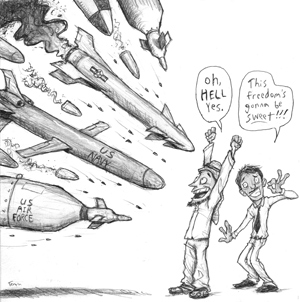 Scott Bressler
Scott BresslerI was doing the reading just now for my Cold War class (taught by Professor Knapp-highly recommended) and I could not stop laughing. The people in Hilltop (I’m sitting just outside) are probably judging me severely, but reading NSC-68, a document that basically outlines U.S. attitude and policy in the Cold War from 1952 on, is nothing if not entertaining. At least for a Cold War-obsessed political science nerd.
I’ll explain: NSC-68 is the document that defined the U.S.S.R. as a serious threat due to ideology and capability and set forth a case for a) spreading American ideology around the world, and b) massive military buildup. The basic premise was that, in the short term, we should hold threats at bay with guns, and wage a huge “this is why we’re the best” campaign to ensure long-term security. That’s the gist.
In and of itself it’s not funny so much as it is pragmatic, or at least appropriate, for the time period. And yet in the context of modern politics, from the perspective of a jaded and cynical liberal who grew up inside the beltway among politicians and their kids, there really are no words.
Why? Because the philosophy spelled out so clearly, so compellingly, so intuitively in NSC-68 has (ironically like communism itself) left a legacy that essentially gets all of the finer points completely backwards. Oh American politics, how I love/hate thee.
What I mean by this backwardness, what makes me laugh but really isn’t even a little bit funny, is, in short, Afghanistan, Iraq, and the “War on Terror.” Also Haiti and the “banana republics” and God knows what else, but for the moment let’s look at the Middle East and Central Asia.
The basic American philosophy is still, as it should be, that we’re right. Freedom is the best, democracy equals freedom, and we have both-let’s share! Okay, but um, Iraq? We went in with force to compel freedom. Isn’t that a little counter-intuitive?
Rousseau said we should “force men to be free,” but he meant freedom at birth by burdening them with civil liberties and obligations, not by blowing up their houses and then handing over cash to start small businesses among the debris. I’m not saying that there was freedom under Saddam Hussein, or that Iraq was where I was planning my next vacation, but going into a culture that our government obviously didn’t really understand with guns blazing doesn’t strike me as the best way to get people to agree with us. “Hey, you shot my brother, husband and second cousin twice removed, but it’s all good. I love the Beach Boys!” It’s probably not going to happen.
What actually happens is that we create our own worst enemies by assuming that we’re right from the get-go, purely because we have a super strong military and are, in fact, a hyper-power. We have it backwards, as I said: we built up our military and instead of using it to hold threats at bay while we showed by example and benevolence that democracy can work, we used it to force other governments to put on the pretense that they agree. Meanwhile, our use of force has given ammunition to others who already hated us that we’re heinous despots, helping cement (though absolutely not justifying) radical beliefs. It’s also alienated others who may have been inclined to work with us under different circumstances.
And so we have the “War on Terror.” We have villages where children are taken from their homes and sent to terrorist training camps because that’s where they’ll be fed, and instead of offering alternatives and cutting off the steady supply of new fundamentalists, we’re torturing whomever we suspect. Instead of going in with humanitarian aid and leaving the impression that we’re good people who want to help and don’t deserve to be terrorized, we’re trying to convince people that we’re good and want to help after we’ve spent a few months shooting at-terrorizing!-them. We’re doing it backwards.
It’s not the Cold War anymore, but it is the Cold War’s hangover. The world’s changed but the rhetoric, though corrupted, has not: “spread freedom, ensure liberty” is still spewed forth from every politician discussing foreign policy. The only difference is that now we don’t believe them.
Guns don’t win wars on ideology; only better ideology can do that.
Sara is a junior in the College of Arts and Sciences. She can be reached via e-mail at [email protected].